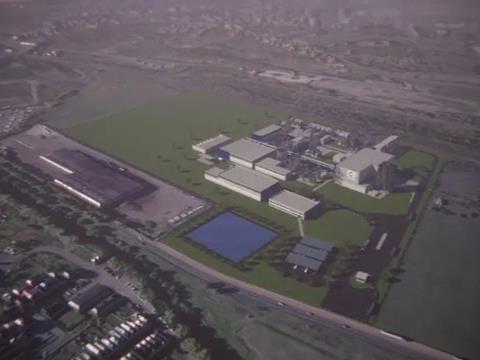
Carbios has been granted a building permit and operating authorization for a bio-recycling plant in Longlaville, expected to reach a processing capacity of 50,000 tons of post-consumer PET waste every year once fully operational.
Said to be the first of its kind in the world, the facility is scheduled for commissioning in 2025 and will be built adjacent to strategic partner Indorama Ventures’ existing PET production plant in the Grand-Est Region without suspensive conditions. The site is 13.7 hectares in size, lending itself to the possibility that its capacity could double in the future.
It is mostly expected to generate PET waste that is non-recyclable through mechanical means – an estimated two billion coloured PET bottles or 2.5 billion PET food trays – and hopes to generate 150 direct and indirect jobs in the region. Its location near the borders of Belgium, Germany, and Luxembourg is strategic for nearby waste supply, with the supply potential envisioned to reach 400,000 tons this year and up to 500,000 tons in 2030 with improved selective collection.
After winning part of the CITEO tender for the bio-recycling of multilayer food trays, Carbios has secured an initial supply source. A consortium consisting of Carbios, Indorama Ventures subsidiary Wellman, and Valorplast will handle 30% of the tonnage proposed by CITEO; the Longlaville plant will handle the flow of multilayer food trays from 2025.
Carbios’ industrial-scale enzymatic recycling solution for PET waste is set to combat plastic pollution by unlocking an alternative raw material to virgin fossil-based monomers – a move set to bring PET producers, chemical companies, waste management firms, public entities, and brands a step closer to meeting regulatory requirements and their individual sustainability commitments.
It can apparently process complex waste that cannot be recycled via conventional technologies and recycle them into food-grade products. As such, the plant anticipates flexibility for waste supply.
Believed to maximize circularity while minimizing environmental footprint, especially where energy consumption is concerned, the facility’s next steps are to further increase the recycling of water required for the process. Construction will begin before the end of the year.
“Everything is now in place so that construction of our plant can officially begin!” says Emmanuel Ladent, CEO of Carbios. “We obtained the permits in line with the announced schedule, and we are eager to deliver a facility of great local and international significance for a circular economy of plastic.
“We would like to thank the French State and the Municipality of Longlaville for their support throughout the administrative procedure and for their commitment in issuing the operating and building permits in 10 months.”
Lionel Arras, director of Industrial Development, continued: “I am very proud of the Carbios teams who have reached this critical milestone in this significant project. With more than 80 engineers involved, both internally and externally, it is a tremendous team effort with our goal of commissioning in 2025 on track.”
Carbios successfully completed its capital increase for approximately €141 million in July 2023; these funds will mostly be used to finance the plant’s construction, which will require an estimated investment of around €230 million. Indorama Ventures is anticipated to cover any investment not funded by the proceeds of the capital increase.
French state subsidies of around €30 million, €12.5 million from the Grand-Est Region, and a portion of Carbios Group’s available cash, totalling €78 million as of 30th June 2023, will also be dedicated to the project.
Françoise Souliman, prefect of Meurthe-et-Moselle, issued the environmental operating permit on 28th September 2023, and Hamdi Toudma, mayor of Longlaville, granted the building permit on 24th October 2023. An administrative procedure – including public consultation to evaluate the site’s impacts on water sources, aquatic environment protection, energy consumption, landscape integration, traffic, and more – was conducted beforehand.
Carbios launched an industrial demonstration plant back in 2021, which formed part of the commercialization of its enzymatic recycling technology. Initial tests were thought to reflect the scalability of the process.
Plans were then announced to build a manufacturing plant that would use Carbios’ PET bio-recycling technology at Indorama Ventures’ PET production site.
Scientific journal ACS Catalysis recently published an article suggesting that Carbios’ PET-degrading enzyme is the best-performing enzyme for depolymerization under industrial conditions.
If you liked this article, you might also enjoy:
The L’Oréal approach to packaging sustainability
What steps is Apple taking to make its packaging more sustainable?
How did Brazil achieve its 100% aluminium can recycling rate – and can it be replicated in the EU?
Experts have their say on the EU’s Packaging and Packaging Waste Directive revisions
Also, if you’re interested in packaging sustainability, you will want to attend our Sustainable Packaging Summit in Amsterdam on 14-15 November. The Summit brings together leaders and pioneers from across the industry to align strategically, learn, network, and create a critical mass to accelerate change. You can learn more by clicking here, and you can buy a ticket to attend here.













No comments yet